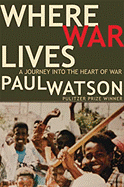

Watson has been a journalist for almost two decades. A self-described war junkie, he's been close to death many times, a man who's taken so many risks, "he'd developed an air of impending disaster." Sudan, Eritrea, Angola, Afghanistan, both Iraq wars, Kosovo--he follows mayhem and destruction and believes that he's wired to crave risk. But after so many years of unrelenting danger, he counts the cost. In a Rwandan refugee camp: "The girl stopped right next to the corpses, standing on scattered straw. Bewildered, she began to cry until she was wailing for someone to come and help her. No one did. A falling tear etched a line down the dust on her cheek. I saw a picture and raised my camera to shoot it, and as I stepped back to frame the child among a few more corpses, I put my foot down on the bony arm of an old woman's dead body. It snapped like a dry stick. And then I knew I was lost, too." He's afraid to get help--he doesn't want to lose his edge. "If I got well, my bent mind reasoned, I'd be too sane to keep doing what I loved."
But he finally gets some help, and continues to be a journalist. He's written a powerful book about war and how it sucks the humanity from our souls. Not a new concept, of course, but one that deserves to be told, and retold, especially by a writer as searing and yet graceful as Paul Watson.--Marilyn Dahl
Shelf Talker: An intense and humane story of a journalist who craves war and whose adherence to the professional code demanding that he record, but not act, devastate his soul.

